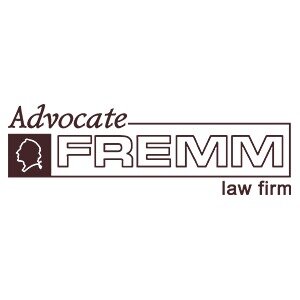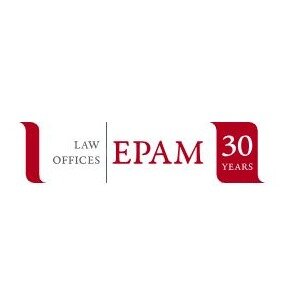
Best Employer Lawyers in St Petersburg
Share your needs with us, get contacted by law firms.
Free. Takes 2 min.
List of the best lawyers in St Petersburg, Russia


Nevsky Prospekt, 88

Khrenov and Partners

Advocate FREMM

Duvernois Legal

Ivanyan and Partners

EPAM Law Firm
About Employer Law in St Petersburg, Russia
In St Petersburg, as in the rest of Russia, employer law is governed by a comprehensive set of national laws and regulations, primarily embodied in the Labor Code of the Russian Federation. This legal framework provides provisions on a wide range of matters, from employment contracts to working hours, remuneration, and dispute resolution. It is designed to ensure the rights of employees are protected while providing clear guidelines for employers to maintain a lawful and effective workplace. As a region within Russia, St Petersburg follows the national legal standards, while also adhering to local regulations and ordinances that complement the federal laws.
Why You May Need a Lawyer
There are several circumstances in which both employers and employees might find themselves needing legal assistance. For employers, scenarios such as drafting or reviewing employment contracts, handling disputes with employees, addressing questions of wrongful termination, navigating collective bargaining agreements, or ensuring compliance with health and safety regulations might require the expertise of a lawyer. For employees, issues like unfair dismissal, wage disputes, discrimination claims, or problems with employment benefits might necessitate legal counsel. A lawyer can provide clear guidance, help avoid potential legal pitfalls, and represent individuals or organizations in administrative bodies or court if necessary.
Local Laws Overview
The labor laws that govern employer-employee relationships in St Petersburg are primarily derived from the national Labor Code. Some key aspects to be aware of include:
- Employment Contracts: All employment relationships should be formalized with a written contract that complies with national laws.
- Working Hours: Full-time work is defined as 40 hours per week, with provisions for part-time and reduced work hours.
- Wages and Compensation: Employers are required to pay wages that are no lower than the minimum established by the government, and they must pay at regular intervals not exceeding half a month.
- Leave and Vacation: Employees are entitled to annual paid leave, parental leave, sickness leave, and other forms of absence as prescribed by law.
- Termination of Employment: Employers must follow specific procedures and grounds when terminating employees to avoid wrongful dismissal claims.
- Health and Safety: Employers must ensure a safe working environment and comply with occupational health and safety standards.
- Dispute Resolution: There are established procedures for resolving disputes, including negotiations, mediation, and, if necessary, litigation.
Frequently Asked Questions
What are the required steps to legally hire an employee in St Petersburg?
To legally hire an employee, employers in St Petersburg must enter into a written employment contract, ensure the individual has a valid work permit if they are a foreign national, register the employee with tax authorities, and set up contributions to social and pension funds.
How is overtime compensated in St Petersburg?
Overtime must be compensated with at least a 50% wage increase, or through the provision of compensatory time off, as stipulated by the Labor Code.
What kind of benefits are employers required to provide?
Employers are required to provide benefits including paid leave, sick leave, and maternity/paternity leave, as per the norms detailed in the Labor Code.
If an employee feels they have been wrongfully terminated, what can they do?
An employee who believes they have been wrongfully terminated may file a claim with the State Labor Inspectorate or take the case to court to seek reinstatement and/or compensation.
Are employers required to have a certain health and safety standard in the workplace?
Yes, employers must adhere to health and safety standards outlined in the Labor Code and federal laws, ensuring a safe work environment for all employees.
What is considered discrimination in the workplace?
Discrimination in the workplace includes any adverse action or harassment based on race, gender, nationality, language, origin, property and official status, residence, attitude to religion, beliefs, membership of public associations, or any social groups.
Can employers fire employees without notice?
Generally, employers are required to give notice before dismissing an employee, unless the termination is due to gross misconduct or other causes stipulated by the Labor Code.
How is employee privacy protected in St Petersburg?
Employees' privacy is protected under Russian personal data laws, requiring employers to handle personal data lawfully and with appropriate consent.
What are the rules for foreign workers in St Petersburg?
Foreign workers must obtain the appropriate visas and work permits, and employers must follow special rules for hiring, which include obtaining quotas and notifying immigration and labor authorities.
How often must employees be paid?
Employees must be paid at least twice a month at regular intervals, according to the Labor Code of Russia.
Additional Resources
Individuals seeking legal advice on employment matters can turn to the Ministry of Labor and Social Protection of the Russian Federation, the State Labor Inspectorate, and local legal aid organizations. Professional legal associations and trade unions can also be valuable resources for both understanding rights and obligations and for accessing representation and support in disputes.
Next Steps
If you need legal assistance in employer-related matters in St Petersburg, Russia, you should first gather all relevant documentation such as contracts, communications, and proof of any disputes or grievances. Next, consult a lawyer who specializes in labor law. Legal professionals can provide advice, represent you in negotiations or disputes, and guide you through the relevant administrative or legal processes. It is important to seek legal help promptly to ensure that your rights are protected, and any issues are addressed in a timely manner.
The information provided on this page is intended for informational purposes only and should not be construed as legal advice. While we strive to present accurate and up-to-date information, we cannot guarantee the accuracy, completeness, or currentness of the content. Laws and regulations can change frequently, and interpretations of the law can vary. Therefore, you should consult with qualified legal professionals for specific advice tailored to your situation. We disclaim all liability for actions you take or fail to take based on any content on this page. If you find any information to be incorrect or outdated, please contact us, and we will make efforts to rectify it.


